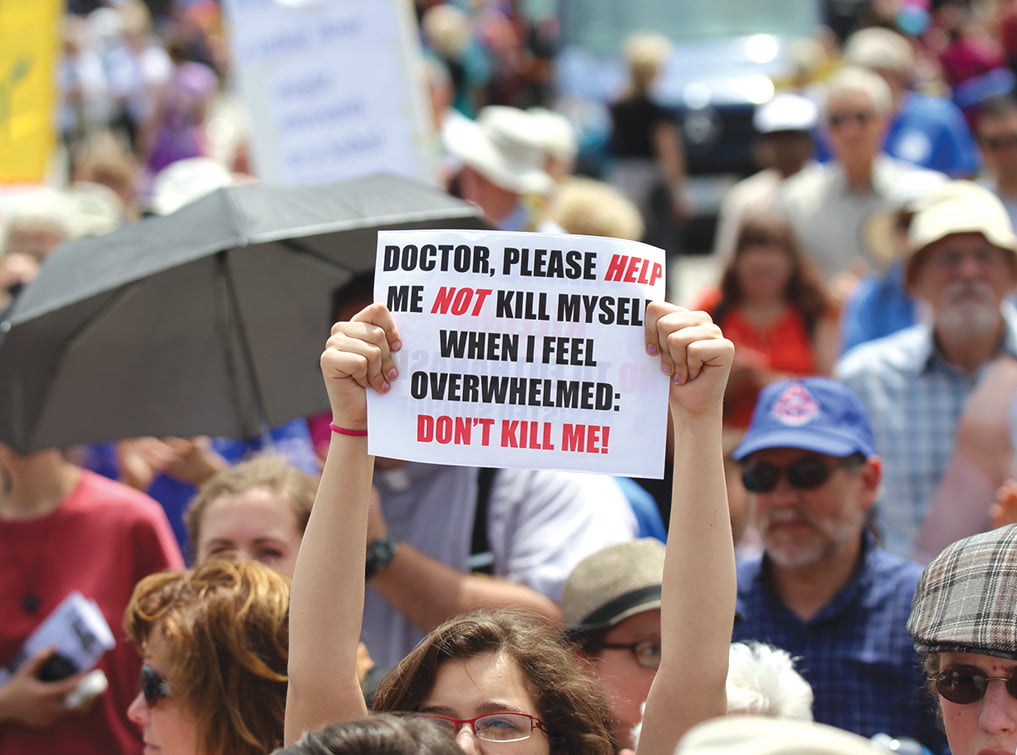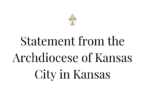
A woman holds up a sign during a rally against assisted suicide in 2016 on Parliament Hill in Ottawa, Ontario. In a Toronto speech, Cardinal Gerhard Muller, prefect of the Congregation for the Doctrine of the Faith, has urged Canadians to work to reverse euthanasia rulings. (CNS photo/Art Babych)
by Joe Bollig
joe.bollig@theleaven.org
KANSAS CITY, Kan. — What if the people you trusted to take care of you decided — without your knowledge or consent — to kill you?
It’s happening in Europe.
Earlier this year, a review panel cleared a Dutch doctor for killing an 80-year-old woman with dementia who lived in a nursing home.
Supposedly, the woman said in the past that she wanted to be euthanized (put to death) at some vague, future date when “she was ready.”
The woman and the doctor had not discussed her euthanization more recently. Nevertheless, the doctor decided that “she was ready.” The doctor laced the woman’s coffee with a sleep-inducing drug, planning to give her a lethal injection while she was incapacitated.
But something went wrong. The elderly woman woke up and began to struggle. The doctor asked the woman’s family to hold the woman down while he injected the killing drug into her.
And they did.
Later, a review panel found the doctor “acted in good faith.”
By no means is this a rare event in the Netherlands. An increasing number of people are being euthanized — voluntarily and involuntarily — for any number of reasons. These include sick infants and children, and persons with autism, Asperger’s syndrome, schizophrenia, depression and dementia.
And the practice has spread from the Netherlands to Belgium and Luxembourg. People go to Switzerland to practice “suicide tourism.” Other European countries are considering adopting the Dutch practice.
Physician-assisted suicide is even happening in the United States. It’s legal in the District of Columbia, California, Colorado, Oregon, Vermont and Washington. Montana has not legalized physician-assisted suicide, but doctors can use a patient’s own request as a defense in the courts for prescribing intentionally lethal overdoses.
Promoters of palliative care and the patient’s rights fear that so-called “death with dignity” proponents are building a slippery slope so that the weak, vulnerable and elderly will be killed rather than cared for.
“As an undergraduate philosophy major, one of the things we were always told is that ‘slippery slope’ arguments are lazy arguments and shouldn’t be used, because they don’t happen,” said M.C. Sullivan, the chief health care ethicist and director for initiatives on palliative care and advance care planning for the Archdiocese of Boston.
“Well, if we just look at this one topic we can see indeed this is a slippery slope we have put our feet upon,” she noted, “and in Europe, they are sliding down it in almost free form.”
Physician-assisted suicide goes by many names, including doctor-assisted suicide, medical aid in dying, medical assistance in dying, and others.
“It all comes down to the same thing,” said Sullivan,
“It means that in the jurisdiction where any of those things are legal, a physician may without criminal liability write a prescription whose sole purpose is death — to kill the patient.”
Why do some people want their doctors to kill them?
In a single word: fear.
They worry about unmanageable and unmitigated pain, said Sullivan. They worry about loss of control. They worry about being a burden to their families.
Making it easy to kill oneself or others is bad public policy, she said, especially when a better alternative exists. That better alternative is palliative care.
According to the National Cancer Institute, palliative care is “care given to improve the quality of life of patients who have serious or life-threatening disease.
Palliative care’s goal is “to prevent or treat the symptoms and side effects of the disease and its treatment, in addition to the related psychological, social and spiritual problems.” It is also called comfort care, supportive care and symptom management.
“Why would we ever go to any policy like [physician-assisted suicide] . . . before we have robustly and vigorously implemented palliative care, which responds to so many of the reasons people give for [considering] physician-assisted suicide,” said Sullivan.
The movement to legalize physician- assisted suicide nationwide is a threat to the promotion of good palliative care.
And there is a real danger that the United States is going the same route as Europe, she said. More states could join the six (plus the District of Columbia) where it is already legal.
“Within the last couple of legislative cycles, more than 25 states have had proposals for the legalization of physician-assisted suicide brought before [their legislatures],” said Sullivan. “So this is very much a national movement. And it’s something of which all Catholics should be informed about and concerned.”
The church points to the right way of caring for the seriously ill, she said. While the church teaches the spiritual value of redemptive suffering, it also teaches about the relief of temporal suffering.
“Very often, I think people misunderstand or are ignorant of the church’s understanding that there are times when the burdensomeness of ongoing, aggressive curative treatment may be disproportionate to any benefit that might be derived,” said Sullivan.
“The church absolutely not only allows but teaches us about how to think about when it might be time to say, ‘Now I prepare myself for death; I don’t continue to seek or accept ongoing aggressive treatment because of that disproportionality, and the burden is too much,’” she added.
Catholics need to familiarize themselves with the church’s teaching and make the appropriate preparations.
“This is where advance directives and the durable power of attorney in a Catholic will and end-of-life [planning] come in,” said Alli Donohue, archdiocesan pro-life consultant.
“It’s very important people have discussions in their families before these things happen,” she continued, “and they have a health care proxy who knows what their wishes are and is able to carry them out, and fight for their wishes if they need to.”
Find out more
For guidance and resources, visit any of the following websites: www.catholicendoflife.org/resources; the U.S. Conference of Catholic Bishops at: www.usccb.org/issues-and- action/human-life-and-dignity/end-of-life; or the National Catholic Bioethics Center at: www.ncbcenter.org.
The NCBE offers a free consultation service by a credentialed bioethicist. For additional information, call (215) 877-2660.






